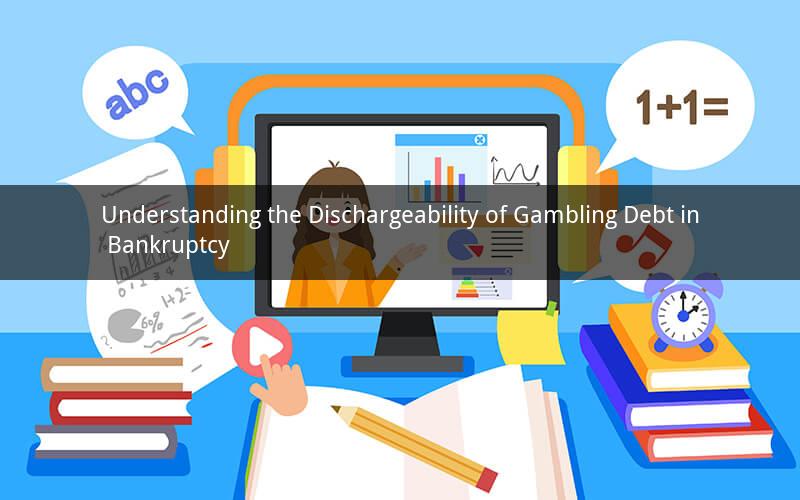
Introduction:
Gambling debt has become a significant issue for many individuals, and understanding whether it is dischargeable in bankruptcy is crucial for those struggling with such financial burdens. This article delves into the intricacies of gambling debt dischargeability, exploring the legal aspects and providing insights into the factors that can affect the outcome.
Section 1: Definition of Gambling Debt
Gambling debt refers to the money owed as a result of gambling activities. This can include debts incurred from casinos, online gambling platforms, or any other form of gambling. It is important to note that not all gambling debts are dischargeable in bankruptcy.
Section 2: Dischargeability of Gambling Debt in Bankruptcy
2.1. General Understanding
In most jurisdictions, gambling debts are considered dischargeable in bankruptcy. This means that individuals who file for bankruptcy can eliminate their gambling debts, allowing them to start fresh financially. However, there are exceptions and certain conditions that may affect the dischargeability of gambling debt.
2.2. Exceptions to Dischargeability
2.2.1. Willful Conduct
In some cases, if the debtor's gambling debt was incurred through willful and malicious conduct, the debt may not be dischargeable. This typically involves situations where the debtor deliberately engaged in fraudulent or deceptive practices to obtain the debt.
2.2.2. Fraudulent Conveyances
If the debtor transferred or concealed assets with the intent to hinder, delay, or defraud creditors, including gambling debt holders, the debt may not be dischargeable. This can occur when individuals transfer assets to family members or friends to avoid bankruptcy.
2.2.3. Certain Debts Involving Government Entities
In some jurisdictions, debts owed to government entities, such as taxes or fines related to gambling activities, may not be dischargeable. However, this varies depending on the specific laws and regulations of each jurisdiction.
2.3. Factors Affecting Dischargeability
Several factors can influence the dischargeability of gambling debt, including:
- The type of gambling activity involved
- The circumstances surrounding the debt
- The debtor's financial situation
- The debtor's intentions and actions
Section 3: Legal Process and Considerations
3.1. Filing for Bankruptcy
To discharge gambling debt, individuals must file for bankruptcy. This involves completing various forms, providing detailed financial information, and attending a bankruptcy hearing.
3.2. Meeting of Creditors
After filing for bankruptcy, creditors, including gambling debt holders, may attend a meeting of creditors. This meeting allows creditors to ask questions and raise concerns regarding the debtor's financial situation and the dischargeability of their debts.
3.3. Bankruptcy Trustee's Role
A bankruptcy trustee is appointed to oversee the bankruptcy process. They have the authority to investigate the debtor's financial affairs, including gambling debts, and determine their dischargeability.
Section 4: Alternatives to Bankruptcy
While bankruptcy can provide relief from gambling debt, it is not the only option available. Individuals may consider alternative solutions such as debt consolidation, negotiation with creditors, or seeking counseling and support services.
Section 5: Conclusion
Understanding the dischargeability of gambling debt in bankruptcy is essential for individuals facing financial difficulties. While most gambling debts are dischargeable, there are exceptions and factors that can affect the outcome. Seeking legal advice and exploring alternative solutions can help individuals navigate the complexities of gambling debt dischargeability and find a path to financial recovery.
Questions and Answers:
1. Q: Can all gambling debts be discharged in bankruptcy?
A: While most gambling debts are dischargeable, there are exceptions, such as debts incurred through willful conduct or fraudulent conveyances.
2. Q: Are taxes related to gambling activities dischargeable in bankruptcy?
A: The dischargeability of taxes related to gambling activities varies depending on the jurisdiction. In some cases, they may not be dischargeable.
3. Q: Can individuals negotiate with gambling debt holders to settle their debts outside of bankruptcy?
A: Yes, individuals can negotiate with gambling debt holders to settle their debts outside of bankruptcy. This can be an alternative solution to dischargeability.
4. Q: What is the role of a bankruptcy trustee in determining the dischargeability of gambling debt?
A: The bankruptcy trustee investigates the debtor's financial affairs, including gambling debts, and determines their dischargeability based on the bankruptcy laws and regulations.
5. Q: Are there any support services available for individuals struggling with gambling debt?
A: Yes, there are various support services available, including counseling and rehabilitation programs, to help individuals overcome gambling addiction and address their financial challenges.